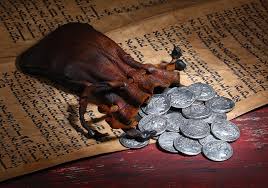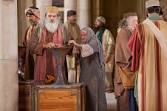Background Passages: Matthew 26:14-16, Matthew 27:1-5, Romans 5:6-8, and 2 Corinthians 5:21
Jesus had to be a little grateful for his Wednesday. A quiet day. After the confrontations with the Pharisees and dawn to dusk teaching, Wednesday was more peaceful. His time in the temple was without controversy or confrontation. His time with his disciples laid back and easy.
Yet, in the back rooms of religious hierarchy where decisions are made, sinful men were plotting his death. In the bosom of his own fellowship, a disillusioned disciple made a choice.
Whether one betrays a country, principle or person the act of betrayal isn’t easily forgiven or forgotten. The names of history’s most infamous traitors remain on the tips of our tongues.
Brutus.
Benedict Arnold.
Judas Iscariot.
None of these names surprise to you. Had I asked you to name the three most infamous traitors, most of you would name these three men. Most of us would put Judas at the top of the list. How did he get there?
Judas is an enigmatic character. When Jesus called he followed. He must have recognized something different in Jesus. His words. The miracles he performed. Everything about Jesus convinced Judas that this was the Messiah for whom his people had waited.
Along the way, the words Jesus preached seemed less like the warrior king he wanted and more like one afraid to do what was necessary to free his people. Judas pushed and prodded his master, but Jesus’ message never strayed.
Knowing it would take money to feed the rebellion he desire, Judas let greed consume him. Two things happened that pushed Judas over the edge. When a woman anointed Jesus with precious perfume, John tells us that Judas protested what he felt was extravagant waste.
“Why wasn’t it sold and the money given to the poor?” objected Judas. John explains that Judas motives were not honorable. That Judas cared little about the poor and wanted the money for himself. (John 12:4-6)
Then after another of Jesus’ private sessions with the disciples on the Mount of Olives, Jesus told them plainly that his hour had come. That in two days he would be handed over to be crucified. (Matthew 26:2) It was the straw that broke the camel’s back for Judas.
The last three years had been a waste. The man he thought would rid them of the Roman occupation, the man he had thought would elevate him to a position of authority in a new kingdom, admitted he would die. Judas had enough.
Whether motivated by pure greed or by the desire to bend Jesus to Judas’ will, the traitor went to the religious leaders and bartered away Jesus’ life. He pocketed their thirty pieces of silver and waited for the right time to turn him in to the authorities. (Matthew 26:14-16)
Some will say Judas had no choice. That this was his destiny. Judas had a choice. He just chose poorly. Had Judas honored his commitment to Christ, the religious leaders would have found another way to get rid of Jesus. They had met that very night in the house of Caiaphas, the chief priest, plotting and planning his arrest and death. Judas just made it infinitely easier.
No. Judas made his choice. And, here’s the rub. He made the same mistake I make almost every day of my life when I reject the will of God and try to bend him to my will. And, together we put Jesus on the cross.
Wednesday night, you see, was the night the last piece of God’s plan to bring salvation to a rebellious world fell in place. The countdown clock was ticking and the only thing that would stop it was if Jesus turned his back on God and walked away. (Jesus also had a choice.)
For us up to this point in our weekly study, Jesus’ death on the cross has been hidden in the mist. Too unpleasant to think about. Pushed in the background of his continued teaching and life-changing lessons about love and devotion to God.
But, the week now takes a darker turn.
We tend to throw Judas at the top of the list of history’s traitors, making him a scapegoat, minimizing the role we played in Jesus’ death.
“You see, at just the right time, when we were still powerless, Christ died for the ungodly…But God demonstrated his own love for us in this: While we were still sinners, Christ died for us.” (Romans 5:6-8)
Judas betrayed Jesus in a despicable way. We’re just as guilty of betraying Jesus as anyone. Turning our backs on him for 30 pieces of selfish desire. Our rebellion. Our sin. While we were yet sinners…
“God made him who knew no sin to be sin on our behalf, so that in him we might become the righteousness of God.” (2 Corinthians 5:21)
Judas stood with the soldiers in the Garden of Gethsemane as they arrested Jesus. He watched from a distance as the religious leaders manipulated the system. Jesus was sentenced to death on the cross.
Seized with remorse for betraying “innocent blood,” Judas tossed the 30 pieces of silver at the feet of the priests and elders. In his grief he found a tree on the outskirts of town and hung himself. (Matthew 27:1-5)
How’s that for a bit of irony? Both Judas and Jesus hung from a tree. Both bearing guilt. Judas dying for his own guilt. Jesus dying for the guilt all who would put their faith and trust in him. He died for me. He died for you. Sinners and betrayers all.
Jesus died for the sins of the world…to give each of us the chance and that choice to “become the righteousness of God.” To live in right relationship with him.
Though Wednesday was for Jesus a quiet day before his crucifixion, it brings with it a brutal reminder of our role in sending Jesus to the cross. It’s not a lesson we like to hear. It is one we need to remember. It is by God’s grace that we are saved.
Thank God for his provision. Thank God that from the moment of creation itself he planned a way to take away my guilt and my betrayal forever. Thank God for Jesus Christ his son.


